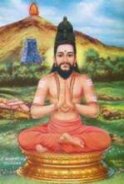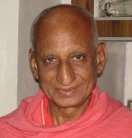

THE ESOTERIC
KANDAR ANUBHUTI
OR
THE SECRET TEACHING ON
GOD-EXPERIENCE
(A Treatise on Adwaitic Realization)
OF
SAINT ARUNAGIRINATHAR

 |  THE ESOTERIC KANDAR ANUBHUTI OR THE SECRET TEACHING ON GOD-EXPERIENCE (A Treatise on Adwaitic Realization) OF SAINT ARUNAGIRINATHAR |  |
 | by N.V. Karthikeyan |  |
| verses contents 35 36 37 38 39 40 41 42 43 44 .. 50 this verse in PDF version (4 parts) p-1 p-2 p-3 p-4 complete download of this book |
VERSE-40 வினை ஓடவிடும் கதிர்வேல் மறவேன் மனையோடு தியங்கி மயங்கிடவோ சுனையோடு அருவித் துறையோடு பசும் தினையோடு இதணோடு திரிந்தவனே.Vinai odavidum kathir vel maraven, Manaiyodu thiyangi mayangidavo Sunaiyodu aruvit thuraiyodu pasum, Thinaiyodu ithanodu thirinthavane. Karma-dispelling Luminous-Vel, I shall not forget; Commentary வினை ஓடவிடும் கதிர்வேல் மறவேன் - "Vinai odavidum kathir vel maraven" -- "I shall not forget the Karma-dispelling Vel.": After offering prayers to the Lord for freedom from the three Eshanas which are inseparable from Maya (Verse-39), the Sannyasin-disciple undertakes uninterrupted meditation on the Luminous-Vel (Jnana-Vel) or the Self or Pure Consciousness, which is meditation on 'Aham Brahma Asmi' as initiated and instructed by his Guru (Verse-37). Only Knowledge or Jnana can destroy Karmas -- 'Jnanaagnih Sarva Karmaani Bhasmasaat kurute tathaa' says the Bhagavad Gita (IV-37). Very aptly Arunagiri says 'Vinai odavidum Kadir-Vel' meaning the 'Luminous-Vel which drives away (destroys) Karmas'. Because, it is the horrible Karmas (Thaazhvaanavai seithana - verse-31) that brought him back from that near Cosmic Consciousness experience (verse-28) to this phenomenal world experience of Maya. Hence to finish those Karmas he undertakes non-stop meditation on the Karma-dispelling Luminous Vel or Jnana-Vel. In 'maraven' (மறவேன்) or 'I shall not forget' is implied his determination, like Lord Buddha, to continue unceasing meditation until he realises God. The Vel is Pure Consciousness or Brahman. Swami Sivananda says in his book 'Lord Shanmukha and His worship': "As the aspirant advances in the practice of meditation, he can gradually dispense with all the paraphernalia and concentrate upon the Vel alone. This Vel is the real Svarupa of Lord Subrahmanya. It represents Consciousness. When all the rest has vanished, this alone remains behind. One who meditates on this Vel as Consciousness surely attains the Supreme Brahman which is Satchidananda." 'மனையோடு தியங்கி மயங்கிடவோ' - Manaiyodu thiyangi mayangidavo. 'Shall I remain caught up and deluded by this phenomenal life?' In the question-like statement, the answer 'no' is implied. This is the usual way of expression. As he has undertaken unbroken meditation on 'Aham Brahma Asmi' till Realization, he is sure that he will go beyond Maya. "Manai" means house, i.e., a place of residence. People live in houses. A house has various sections, such as the portico in the front portion, the drawing room, the bedroom, the kitchen, the dining hall, the bath room, the terrace, the basement, the back-yard, the garden with trees and well, etc., etc. - all within a big compound wall. One moves within the house from one area to another as needed. In whichever portion of the house one might be, one is still within the boundaries of the house. This is so far as the body is concerned. But, for the soul or Jiva, the "Manai" (house) is the entire domain of Maya which, as seen in the previous verse, comprises of the seven great births, in 84 lakhs of Yonis or species, in different Lokas or realms. Jivas might take birth in any of these realms according to their Karmas. In whichever realm the soul might be, it is still within the limits of Maya. The whole of creation projected by Maya is the "Manai" (place of residence) for the soul, which it has to overstep in order to attain God. This is done by meditation on the Vel (or Self). So, the determined meditation undertaken by the Sannyasin-disciple gives him supreme confidence that Samsara or the play of Maya cannot delude him. He feels certain that he shall burn all Karmas, get Liberation and be free from transmigration once and for ever. Then, the phenomenal life would look like a dream or appear as a mere play, even as it was a Lila or divine play for the Lord to search for Valli in the millet-field and other places. This is a unique verse which reveals the true significance and the real glory of the Vel. The Vel is not merely the divine weapon of Lord Skanda that killed the Asuras, as is usually conceived of and referred to, but is also the supreme object of meditation itself, i.e., it is identical with the Absolute. In the previous verse, the soul's longing for freedom from the three Eshanas was echoed. It is now expressed as constant thinking of or meditation upon the Vel. What is the Vel and what is its power? Just as the sun dispels darkness without any effort by its mere shining, the Vel, by its very nature, drives off or destroys Karmas. Significantly, the Vel, in this verse, is referred to as the "Kadir-Vel" - the Vel which is of the form of Luminous Light - which is otherwise known as Jnana-Vel (Wisdom Vel). "I shall not forget the luminous Vel that dispels Karmas." The Vel symbolises Pure consciousness, which is the Self (Brahman). Non-forgetfulness of the Vel, therefore, means an effort at establishment in the awareness of the Self, which naturally will dispel all Karmas. Karmas, virtuous or otherwise, are due to desires. Prompted by desires, man performs Karmas. Why does one engage oneself in activity of any kind? It is desire that goads one to activity, to get something, to achieve something that is unachieved. Why is there desire? Because of ignorance of the real nature of things, and also because of ignorance (Avidya) of one's own essential nature. To think that one is the body or mind, and to strive to possess things and enjoy them for getting happiness, is due to ignorance of one's essential nature, or the Self. The Self, which one really is, is Immortal and Eternal, Bliss and Peace, Wisdom and Infinite Power. Not to forget this, i.e., to be rooted in this awareness, will remove ignorance. This Self is the Vel that can destroy ignorance, as the sun removes darkness. When ignorance is, thus, removed by an awareness of the Self or Vel, desires cease and with them Karmas, too. Ignorance is not a positive or real thing, even as darkness is not; it is only the absence of Wisdom, just as darkness is only the absence of light. When light comes, darkness vanishes automatically and no effort is necessary to remove it. So also, when Wisdom dawns, when a perpetual awareness of the Self is maintained, ignorance vanishes. So, to break the chain of Karma, which is the effect of desire and ignorance (Avidya, Kama, and Karma - the three knots of the heart that bind the soul to Samsara or phenomenal existence), non-forgetfulness of the Vel or a perpetual awareness of one's essential nature is the only means. When the thinking principle in man, which ultimately is consciousness itself, thinks of the Vel or Consciousness, i.e. Itself, it is severed from its connections with the mind and senses, and at once these cease functioning, as a huge machine comes to a standstill when the power is withdrawn from it. Thus, consciousness resting in consciousness immediately puts an end to Karmas. Hence, he says, "Never shall I forget the Light-Vel, which drives off Karmas. Therefore, no more shall I be subject to Samsara." Ceaseless remembrance of the Vel (or trying to be rooted in the awareness of the Self), frees one from the shackles of Karma and liberates one from the effects of Samsara. Here, the meditation reaches its zenith and culminating point, where the meditation is on the Absolute or Satchidananda, as pure Consciousness - the Vel. Now, what happens to the phenomenal life when one, thus, tries to be rooted in the awareness of the omnipresence of the Self or in the ceaseless remembrance of the Vel? The world will be there, but not as before. To such a one the world may appear to be there, and he may also appear to be subject to the vicissitudes of life. But, to himself, it is all a mere joke, a play. Even as Maya is not a binding factor to the Lord, so becomes Samsara to him. Nothing affects him anymore. He may carry on his usual activities as before, apparently in the same manner; but, because of this peculiar awareness, he carries on those activities without being affected by them, without delusion or agitation, as he is ever conscious of the unchanging Reality in which he is trying to be rooted. How beautifully is this fact brought in this verse when he says that Lord Skanda went in search of Valli to the millet-field, etc.? Valli used to stand on a loft in the midst of the millet-fields and drive off the birds that came to peck the corn. Sometimes, she would go to the nearby mountain-spring to drink water, or to the waterfall for a bath. But all this she did during the day, and well before sunset she would return to her home in the adjoining village. The Lord knew all this. But, He would still go to those places in the evening, after she had left for her home, and search for her in those places. Knowingly, why did the Lord do so? It was a pleasure for Him, a Lila, an act of grace! Not only that; He would not be disappointed for not meeting her, because even before leaving for those places, He knew that she would not be there; on the other hand, it was a joy to search for her. The outward act of the Lord in searching for Valli was like that of any other lover for his beloved, but the mental attitude was quite different, which makes all the difference. Even so, one who is trying to be fixed in the awareness of the Omnipresence of the Lord, does all actions as anyone else would do and he may appear to be suffering and tied down to Samsara, but it is all meaningless for him. He knows that the Self is the sole Reality and the world is essence-less. Nothing affects him anymore, even as the Lord was not disappointed. In this verse, the soul is not fully established in Brahman-consciousness, but is trying to fix itself in It by ceaseless meditation. Even this, gives it the conviction that it will go beyond the limits of Maya and so it exclaims, "Am I to be caught up or deluded by the different realms of Maya (i.e. 'Manai'), when my meditation on Brahman is unremitting? No, phenomenality cannot affect me." |
| contents 35 36 37 38 39 40 41 42 43 44 .. 50 this verse in PDF version (4 parts) p-1 p-2 p-3 p-4 |
| ... www.kaumaram.com ... The website for Lord Murugan and His Devotees முகப்பு கௌமாரம் அட்டவணை மேலே தேடல் home Kaumaram contents top search |
Kaumaram.com is a non-commercial website. This website is a dedication of Love for Lord Murugan. Please take note that Kaumaram.com DOES NOT solicit any funding, DIRECTLY or INDIRECTLY. |